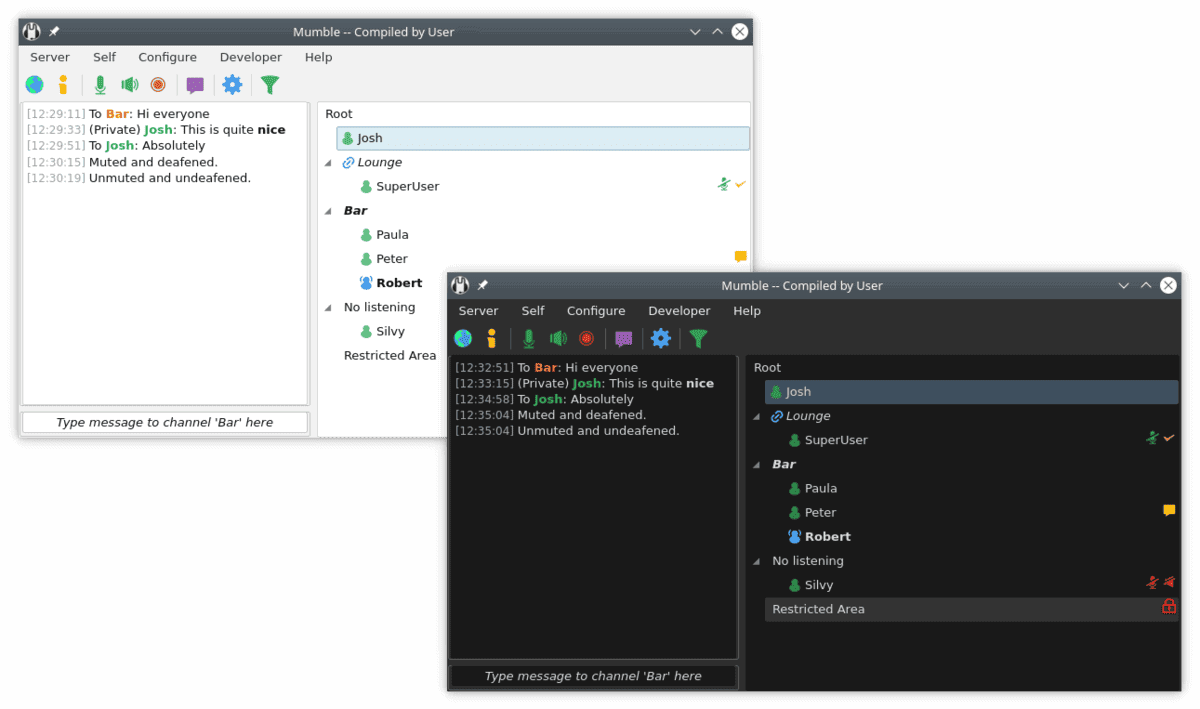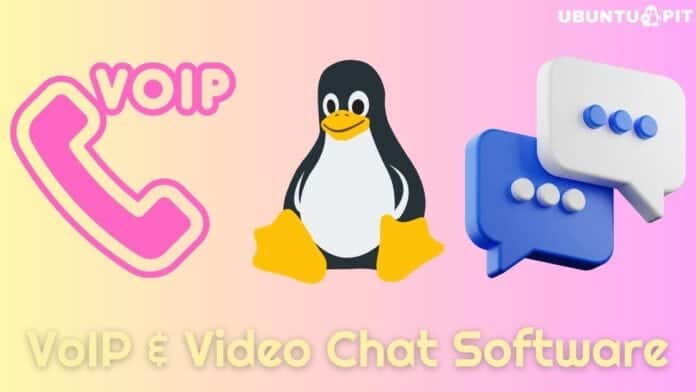In today’s world, the internet has become an integral part of our lives, providing tremendous technological advancements that have changed how we communicate and interact.
From social media platforms to video conferencing software, the internet has revolutionized communication. One of the most significant developments in this field is Voice over Internet Protocol (VoIP) software and voice chat programs.
Linux is a major player in this field, offering a wide range of high-quality VoIP and voice chat software. However, choosing the best fit for your needs can be difficult with so many options available.
In this article, our experts have selected the best voice chat and VoIP options for your Linux desktop. We will also outline the primary differences between VoIP software and voice chat programs, making it easier to understand which one best suits your needs.
So, let’s dive in and explore the world of voice communication software for Linux.
VoIP vs. Voice Chat Programs: Simplest Difference
We often see users scratching their heads when differentiating between VoIP software and voice chat programs. To uncover this mystery, we’ll summarize the primary difference in concepts between these two.
VoIP software is a program that lets users use the VoIP (Voice Over Internet Protocol) communication mechanism to make calls over the Internet. This is quite a powerful technology as users can now make calls worldwide without paying a hefty amount to their mobile carriers.
On the other hand, voice chat software is used to send and receive voice messages across users in almost real-time. It’s quite similar to regular chat programs. But instead of sending text messages, you will send voice messages only.
Best VoIP & Voice Chat Software for Linux
We have compiled a list of the best VoIP and voice chat software for different Linux distributions. Our experts have made extra effort to make this list as informative as possible.
We hope this guide will provide you with the insights you seek. Compared to VoIP programs, the number of high-quality voice chat programs is relatively low since gamers mainly use them. Therefore, they are less common.
1. Jitsi
Jitsi is a powerful and innovative set of cross-platform open-source projects that aim to make voice and video conferencing accessible to the general people. The project has evolved since its emergence to a whole new level and is currently hailed as one of the best.
You can very quickly develop and deploy personalized video conferencing solutions that are secure and focused on privacy. Jitsi also facilitates advanced routing concepts, including simulcast, bandwidth estimations, and scalable video coding.
Features of Jitsi
- Jitsi is compatible with WebRTC and supports advanced protocols like SIP, XMPP/Jabber, AIM/ICQ, and IRC.
- It features built-in desktop streaming support and a direct media connection establishment feature.
- Jitsi Videobridge allows users to build high-quality video conferencing infrastructures that are easily scalable.
- Jitsi Meet API can be leveraged to build a custom GUI for video conferencing solutions.
2. Mumble
 Mumble is a very compelling voice chat software for Linux that allows users to chat with each other conveniently. It utilizes a client-server architecture that allows users to communicate easily using dedicated servers.
Mumble is a very compelling voice chat software for Linux that allows users to chat with each other conveniently. It utilizes a client-server architecture that allows users to communicate easily using dedicated servers.
This open-source voice chat software is suited to gamers who want flexible yet straightforward voice chat programs to carry on real-time communication during gaming sessions. Although the program only supports its own protocols, Mumble offers an overall satisfactory performance from a gamer’s perspective.
Features of Mumble
- The overlay displays status information directly from the rendered application and provides a heads-up of who’s listening and talking while in-game.
- Mumble has one of the lowest latency rates, making it a perfect voice chat solution for competitive gamers.
- It incorporates powerful encryption techniques to ensure that voice messages are safe and won’t fall into the hands of malicious users.
- It uses certificates for authentication and can recognize your friends across different servers.
3. Linphone
Linphone is, without any doubt, among the best open source VoIP software available for Linux. This internet telephony software lets users make free voice and video calls directly over traditional IP networks.
Linphone also supports instant text messaging and has an awe-striking GTK+ GUI for more straightforward navigation. Seasoned users can run the program as a console-mode application (linphonec). It is compatible with the popular SIP protocol and is cross-platform.
Features of Linphone
- Linphone offers an attractive GUI interface that makes navigation a breeze.
- It comes without box support for audio conferencing and call transferring.
- Linphone lets users share pictures and files very quickly and supports HD video.
- Incorporating the GNU GPL license allows easier personalizing and extending this Linux voice-over IP software.
4. Discord
 If you’re an extreme gamer looking for the best all-in-one voice and text chat software, you might consider Discord a safe bet. This freeware voice-over IP application was designed to keep users like you in mind and does an entirely satisfactory job overall.
If you’re an extreme gamer looking for the best all-in-one voice and text chat software, you might consider Discord a safe bet. This freeware voice-over IP application was designed to keep users like you in mind and does an entirely satisfactory job overall.
Most gamers use Discord as a voice chat client to connect with their companions and conveniently organize multiplayer gaming sessions on Linux.
Features of Discord
- Discord allows unlimited servers with no slot restrictions for connecting with your friends more easily.
- The interface is attractive and intuitive, making Discord easy to use and extra productive.
- Discord utilizes the Opus codec to suppress noise and echoes as much as possible.
- It is one of the most resource-friendly Linux VoIP Software and has very low latency.
- Users can customize the hotkeys as they deem fit and easily connect with Twitch, Steam, Google, Facebook, Microsoft Live, and others.
5. Asterisk
Asterisk is a robust framework for building compelling communications applications. It is a popular open-source Private Branch eXchange (PBX) and telephony toolkit that supports a hybrid TDM and IVR platform with ACD functionality. Apart from internet telephony, Asterisk also supports traditional PSTN telephony.
This protocol-agnostic open source VoIP software has become one of the most popular VoIP PBX around the globe in recent times and enjoys immense popularity among developers of internet telephony projects.
Features of Asterisk
- Asterisk supports powerful video and VoIP protocols, including SIP, MGCP, and H.323.
- It is a gateway between regular IP phones and PSTN (Public Switched Telephone Networks).
- Users can send and receive voice mails to contacts across the internet.
- Developers can easily extend the programs with scripting languages like AGI.
- Asterisk supports almost every SIP-compliant telephone and acts as the registrar and user agent.
6. TeamSpeak
TeamSpeak is arguably one of the best Voice Chat Software for Linux gamers. It leverages various internet protocols to allow users to communicate on a chat channel while gaming. Thanks to its powerful and innovative features, many gaming communities worldwide use TeamSpeak to organize and coordinate teams playing online games.
The application allows fast and secure voice chat communication for gamers without worrying about losing focus while in-game.
Features of TeamSpeak
- The highly customizable application offers high-quality voice chats with integrated automatic microphone volume adjustment support.
- The latency rate is negligible and offers an almost real-time voice chat experience.
- TeamSpeak’s public key authentication feature makes it more secure than regular voice chat programs.
- TeamSpeak has built-in audio positioning support that enables placing your teammates around you.
7. FreeSWITCH
FreeSWITCH is a feature-rich telephony platform that facilitates the creation of scalable voice and chat-driven products. You can use FreeSWITCH as a switching engine, media gateway, or media server to host IVR applications.
FreeSWITCH is straightforward to integrate with other PBX systems like Asterisk because it supports SIP, H.323, IAX2, and GoogleTalk. It can also act as a bridge to connect legacy systems with futuristic Linux Voice Over IP Software.
Features of FreeSWITCH
- FreeSWITCH utilizes a centralized user/domain directory and features nanosecond CDR granularity.
- The high-performing core engine is multi-threaded and supports call recording, software-based conference, and wideband conferencing.
- It has built-in support for an extensive set of codecs with custom ringback tones.
- FreeSWITCH has a multi-lingual speech phrase interface supporting standard IP/PBX features.
8. Skype
 When discussing the best VoIP software regardless of platform, Skype is the definitive answer for many. Since it entered the Linux ecosystem, Skype has also gained massive popularity among open source enthusiasts worldwide.
When discussing the best VoIP software regardless of platform, Skype is the definitive answer for many. Since it entered the Linux ecosystem, Skype has also gained massive popularity among open source enthusiasts worldwide.
It is a compelling VoIP application that allows users to make peer-to-peer phone and video calls freely around the globe. The Linux variant of this popular VoIP application has been tested on many platforms and should run okay in most distros.
Features of Skype
- Users can share real-time video calls with up to ten people simultaneously.
- Skype lets users share photos, emoticons, stickers, messages, or even their screen with another user.
- Users can send money to their friends or Skype contacts by using PayPal.
- The number of people allowed to join in an audio call is unlimited.
- Skype allows users to adjust their profiles and appear to the world as they like.
9. Rakuten Viber
Viber is a full-fledged video and voice chat software for Linux that provides VoIP services like video calls, voice calls, and text messaging across the globe. It offers some innovative functionalities, including sound positioning and instant voice messages.
The user interface is intuitive and feels easy to play with. Users can explore the application quickly and communicate with friends effectively.
Features of Viber
- Viber incorporates a client-server architecture where the connection is always encrypted and secure.
- Don’t worry if you own multiple devices; Viber will sync them without you feeling a thing.
- It’s among the best VoIP software for resource consumption, all thanks to its lightweight design approaches.
- The sound quality of Viber is excellent, and it provides genuinely real-time communication.
10. Blink
Blink is a simple-to-use yet feature-rich SIP client that makes VoIP communications easy for regular users. It has an interactive user interface that is minimalistic in view but boasts powerful features.
This cross-platform SIP client is arguably among the best VoIP software and provides almost every feature you’d want in everyday Linux VoIP Software. If you’re looking for an intuitive and easy-looking VoIP program, we suggest you try Blink.
Features of Blink
- Thanks to its acoustic echo cancellation technology, users can make stable video and voice calls using Blink.
- Communication data is encrypted in an end-to-end manner using the ZRTP cryptographic protocol.
- Users can use instant messaging services faster with Blink than many other such applications.
- Blink lets users share files online and provides progress and delivery information.
- Users can video conference using Blink and share screens with integrated audio support.
11. Jami
Jami is a SIP-compatible VoIP application for Linux that provides a robust set of useful functionalities needed for real-time VoIP communications. This is one of the best VoIP software for open-source traction and is quickly updated.
It offers a multi-functional VoIP package that has thwarted the dominance of VoIP giants like Skype in the Linux community. Known earlier as Ring, this Linux voice-over IP software offers separate builds for GNOME and KDE.
Features of Jami
- Users can make any number of voice, video, or conference calls while having the same limit for text messaging.
- All user and message data are encrypted with powerful encryption algorithms to maintain data integrity.
- Our experts found the account assistant wizard of this open-source VoIP software to be much more helpful than others.
- It comes with built-in support for Jack Audio Connection Kit and PulseAudio.
Ending Thoughts
Choosing the right voice chat software for Linux can be tedious due to the vast number of options available in the community. Our experts have invested considerable time in creating a carefully curated list of Linux Voice-over-IP (VoIP) software to make things easier for you.
We hope our list will provide you with all the necessary information to find the best Linux VoIP software that meets your requirements. Please let us know your pick from our list in the comments section. Also, stay tuned for more new Linux top lists.
